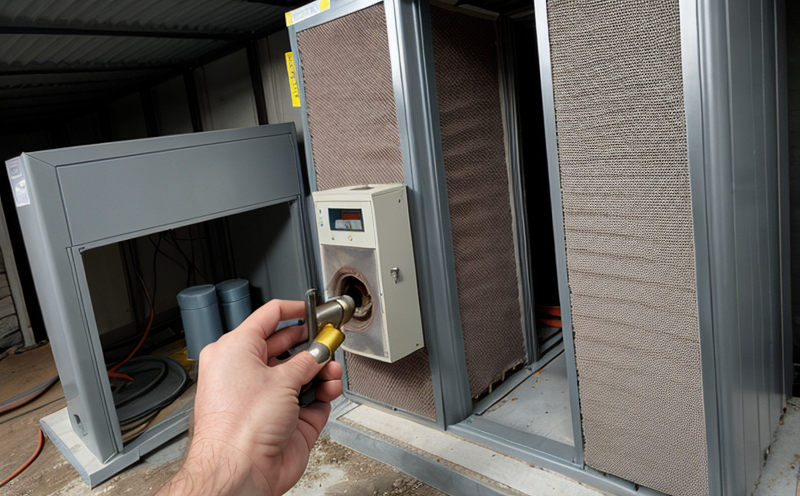Thermal comfort evaluation of automotive seat fabrics
The thermal comfort evaluation of automotive seat fabrics is a critical aspect in the automotive industry. Comfort and safety are paramount, especially when it comes to seating materials that directly interact with passengers. Thermal performance testing ensures that the textiles used in automotive seats provide adequate insulation against heat or cold, thereby enhancing passenger well-being during various driving conditions.
Thermal comfort is influenced by several factors including the fabric's breathability, thermal conductivity, and the ability to manage moisture effectively. These properties are evaluated through standardized testing methods that simulate real-world scenarios in automotive environments. Automotive seats need to be designed not only for occupant safety but also for providing a comfortable temperature environment regardless of external conditions.
Testing procedures involve subjecting samples of seat fabrics to controlled thermal and humidity environments, measuring heat transfer rates, and assessing moisture vapor transmission. This is crucial because automotive interiors can experience wide variations in ambient temperatures, affecting passenger comfort levels. By accurately evaluating these parameters, manufacturers can fine-tune their products to meet stringent industry standards.
One of the key considerations in thermal comfort evaluation is ensuring that the fabric maintains a balance between insulation and breathability. Over-insulation could lead to excessive heat retention inside the car cabin, while insufficient insulation might allow too much heat transfer, making passengers feel cold. Achieving the right balance requires precise control over test parameters such as temperature gradient, humidity levels, and duration of exposure.
Standardized testing methods like ISO 16798-2:2014 provide guidelines for simulating realistic conditions under which automotive seat fabrics will be used. These standards ensure that the tests are reproducible and consistent across different laboratories worldwide, facilitating international comparisons and acceptance of results.
Another important aspect is the evaluation of fabric's ability to manage moisture effectively. Moisture vapor transmission (MVT) testing assesses how well a material can prevent condensation or excessive sweating within the automotive cabin. Proper MVT management helps maintain a dry microclimate around passengers, contributing significantly to overall thermal comfort.
- ISO 16798-2:2014: Thermal insulation properties of textiles — Part 2: Determination of heat transfer coefficient and temperature difference between two air streams
- ASTM E563: Standard Test Method for Moisture Vapor Transmission Rate of Flexible Materials Using a Cool Moist Air Exposure Chamber
The testing process typically involves conditioning the fabric samples to standard conditions, then exposing them to controlled temperature and humidity environments. Instruments such as calorimeters or heat flow meters are used to measure thermal properties accurately. After exposure, detailed analyses of data collected from these instruments provide insights into the thermal performance characteristics of the fabrics.
For R&D engineers and quality managers involved in automotive seat design, this testing is indispensable. It ensures that new materials meet not only safety regulations but also deliver superior passenger comfort. Compliance officers rely on accurate test results to confirm adherence to international standards, while procurement teams can use these evaluations to select the most suitable suppliers.
In conclusion, thermal comfort evaluation of automotive seat fabrics plays a vital role in enhancing occupant satisfaction and safety within vehicles. By leveraging advanced testing methodologies based on recognized international standards, manufacturers can optimize their product designs to cater effectively to diverse driving conditions and passenger preferences.
Eurolab Advantages
EuroLab prides itself on offering comprehensive thermal comfort evaluation services tailored specifically for automotive seat fabrics. Our state-of-the-art facilities equipped with precision instruments guarantee accurate, reliable test results that meet the highest industry standards.
- ISO 16798-2:2014: Compliance with this standard ensures that our tests are consistent and reproducible across multiple laboratories.
- ASTM E563: Our use of this method for moisture vapor transmission testing provides robust data on fabric performance under various environmental conditions.
We employ a team of experienced professionals who understand the nuances involved in automotive seat material development. Their expertise ensures that every test is conducted meticulously, adhering strictly to specified protocols. Additionally, our commitment to quality control extends beyond just conducting tests; we offer expert advice on selecting appropriate fabrics and optimizing design parameters for optimal thermal comfort.
Our clients benefit from the latest technological advancements in testing equipment, ensuring precision and accuracy in all evaluations. Moreover, EuroLab maintains strict confidentiality regarding proprietary information shared by our partners. This commitment to professionalism and integrity makes us a trusted choice among leading automotive manufacturers globally.
Why Choose This Test
Selecting the appropriate thermal comfort evaluation method for automotive seat fabrics is essential for several reasons:
- Promotes passenger satisfaction: Ensuring that passengers remain comfortable throughout their journey contributes positively to brand reputation and customer loyalty.
- Enhances safety: Properly insulated seats contribute significantly to occupant protection during accidents or extreme weather conditions by maintaining a stable temperature environment inside the vehicle.
- Facilitates regulatory compliance: Meeting international standards such as ISO 16798-2:2014 and ASTM E563 demonstrates commitment to quality and reliability, which is crucial for market entry in different regions.
Incorporating thermal comfort evaluation into the design process enables manufacturers to identify potential issues early on, allowing them to make necessary adjustments before production begins. This proactive approach reduces costs associated with rework or recalls later down the line.
Moreover, choosing this test ensures that the final product not only meets current regulatory requirements but also anticipates future trends in automotive design and passenger expectations. As technology advances, so too does our ability to evaluate and improve thermal comfort performance continuously.





